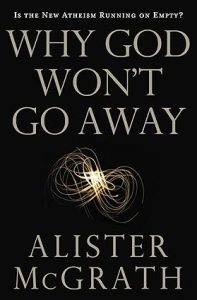
King’s College Theology Professor Alister McGrath’s 2010 book Why God Won’t Go Away is a refreshing read in this age of brash clickbait and sweeping statements. He can peel off discredited New Atheism from the broader atheist or secular humanist movement, treating serious thinkers with the respect that is their due, while pulling to pieces New Atheists for their anti-intellectualism and arrogance. Atheism as a whole has a much longer and far more serious history. Yet at the time of the publication of McGrath’s book and even more so today, New Atheism seems on the one hand to have been a flash-in-the-pan phenomenon, while nonetheless leaving a mark — even if it wasn’t always what its founders had expected.
Richard Dawkins, Daniel Dennett, Sam Harris, and Christopher Hitchens all commanded attention and attained popularity in the shadow of the September 11th, 2001 terrorist attacks and as social media platforms, especially YouTube, Facebook and Internet forums, were ascending. In the eyes of a shell-shocked public, the 9/11 attacks — in their reading — highlight the vile, odious nature of religion, the orgy of hate that it foments, and the risk that it poses to modern, enlightened western society. At the same time, social media — and the anonymity that it can offer — encouraged the creation of echo chambers for atheists who often lacked affirming communities, as well as platforms for soundbites, diatribes and mockery of the opposing side — all of which passed for debate and discussion. New Atheism took off in 2005 with Harris’ The End of Faith, followed by Dawkins’ The God Delusion, Hitchens’ God is Not Great and Dennett’s Breaking the Spell, all published in a flurry of atheist activity in 2006.
McGrath recounts how the New Atheists, who mercilessly mocked Christians and other theists for being irrational, fanatical and rigid, while casting all of Islam as an extreme and grotesque boil on the human psyche, ended up mimicking many of the negative characteristics they attributed to their adversaries. McGrath not only read the seminal works of New Atheism and surveyed the live debates in which their representatives participated, but he descended into the morasses of New Atheist Internet forums and discussion boards. He quotes from these different sources, painting a picture of loud, angry men who seem unaware of the fact that what they say and do stems from their profound frustration with one thing in particular: that faith in God is stubborn and the cult of reason proposed by the Enlightenment or scientific discoveries that have shaken our understanding of our origins or horrors attributed to religious people haven’t eradicated belief in the transcendent. Far from offering sober, level-headed and rational analysis, the New Atheists take their readers and followers on a fraught emotional roller coaster that has much in common with the worst of fundamentalist religiosity.
That’s not to say that the Four Horsemen, as the leading lights of the movement have been dubbed, are stupid men. Their books became bestsellers and they attained celebrity status. But they were men who knew better, yet allowed their own hate, arrogance, frustration and insecurity to sacrifice intellectual rigour. They found the worst and weakest manifestations of religious belief, using these as the justification for their smear, while mostly ignoring the serious theologians, writers and thinkers that have helped form the western world’s grasp of the transcendent up and down the centuries.
McGrath doesn’t paint the four iconic New Atheist voices with quite the same brush. The End of Faith is especially odious when Harris argues that as religion can cause immense damage, “some propositions are so dangerous that it may even be ethical to kill people for believing them.” McGrath notes that Harris’ view is “morally reprehensible” and adds: “happily, many moral atheists outside the New Atheist establishment have made clear their revulsion against Harris’s dogged, even violent intolerance of religion.” For a more measured view on the capacity of religion to justify violence, McGrath refers to Mark Juergensmeyer’s 2000 book Terror in the Mind of God. Both within the text itself and in a handy section on recommended further readings, McGrath introduces the reader to many avenues of reading and learning. It’s an accessible work overall and one written with the mind and style of a good teacher.
Dawkins expands on some of Harris’ ideas, provides more depth, but he’s no less fanatical. He does, however, go further in discussing how science, in his reading, undermines belief in God. Specifically, Dawkins argues that belief in God is an “accidental by-product” of evolution. McGrath, however, points out the inherent problem for New Atheists. He writes: “If Darwinian evolution is indeed a random process, how can we speak about ‘accidental’ or ‘unintended’ outcomes?…Does he really think that evolution is guided by some kind of metaphorical mind that steers it in appropriate directions while permitting occasional digressions and byways?”
Of the Four Horsemen, McGrath suggests that Dennett is the least inflammatory, but also the most dull. Perhaps as a philosopher dabbling in science, he is also out of his depth. Hitchens, by contrast, is presented as an excellent and highly effective writer, offering pithy statements like “religion kills.” In a moment of irrationality and overheated polemics, Hitchens claimed that Mother Theresa was a fraud, that “millions of people are much worse off because of her life” and bemoaned the fact that there is no hell, as it would be good to see her tormented in it. Hitchens ended up apologizing for this statement.
Whenever Hitchens admired the contributions of religious people, McGrath recounts how he attempted to divorce them from their faith. Martin Luther King Jr. made exceptional contributions to civil rights, but in Hitchens’ estimation, he wasn’t actually a Christian. Dietrich Bonhoeffer, the Lutheran pastor who was murdered by the Nazis, was basically a humanist, rather than a Christian. It would appear that any person of faith who did commendable things would have done good despite his or her religious beliefs, rather than stemming from them. Perhaps they never really believed at all.
McGrath’s book is gracious in tone. That stands in contrast to many of the pronouncements and activities of New Atheists. In 2009 the Center for Inquiry, for example, thought it apt to celebrate “Blasphemy Day,” which involved displaying a painting entitled “Jesus Paints His Nails,” depicting Christ adding polish to a nail used in crucifying him. The vapid piece was condemned by several atheists, including Stuart Jordan who served as an advisor to the Center, and by the elderly Paul Kurtz, a prominent secular humanist who had established the organization in 1991. He considered New Atheism increasingly vicious, dogmatic, militant and intolerant.
New Atheism did, however, rekindle the waning fires of the “science versus religion” debate — an otherwise false and tired dichotomy. But McGrath argues that the discovery of the Big Bang by physicist and Catholic priest Georges Lemaître reinserted the possibility or likelihood of the existence of God in discussions around the universe. Previously, science held that the universe had always existed — seemingly negating the need for a Creator. By the mid-twentieth century, however, scientists had largely coalesced around the idea of the Big Bang event as the origin of the universe, even while atheists like Fred Hoyle initially recoiled at the idea, concerned as he was that this could be seen to have religious undertones. In 1998, William Lane Craig, a theist philosopher, debated then atheist Anthony Flew. He shared the following line of argumentation, summarized here by McGrath:
- “Major premise: whatever begins to exist has a cause.”
- “Minor premise: the universe began to exist.”
- “Conclusion: therefore the universe has a cause.”
In addition to the Big Bang, McGrath speaks of a universe that scientists generally agree appears to be “fine-tuned” for life. He quotes Hoyle, who noted that it would seem that “a super-intellect has monkeyed with physics, as well as chemistry and biology, and that there are no blind forces worth speaking about in nature.”
When McGrath published his book in 2010, New Atheism already appeared to be in trouble. Since then, this has become more obvious. For one, Hitchens died of cancer in 2011. Dawkins, for his part, fell out of favour with part of his base. In 2021, he was retroactively stripped of his “Humanist of the Year” award after the American Humanist Association found some of his comments to be Transphobic.
While New Atheism eventually unravelled, its brief ascendancy led to an important counter-development among theists — one that was still in an embryonic state when McGrath published his book. A Catholic priest in the United States called Father Robert Barron began producing YouTube videos largely in response to the New Atheism. He called it out, like McGrath, as anti-intellectual. The clergyman, originally from the American Midwest, would descend into the trenches of YouTube comments and debate random, anonymous users. Father Barron would become Bishop Barron and he would come to establish the most intellectually robust and popular Catholic presence on YouTube, alongside a publishing and video production company, and academic institute, called Word on Fire. Bishop Barron is for the Internet what Bishop Fulton Sheen was in the era of cable television. He has also debated a new generation of atheists, and has done so with a mutual respect that is exceedingly uncommon online. The best example of this would be his 90-minute YouTube debate with Alex O’Connor — available here and well worth watching.
McGrath’s Why God Won’t Go Away has aged quite well. It places New Atheism in the context of the anxieties that preoccupied minds at the turn of the century, particularly terrorism, religious violence and Islamic extremism. Atheism itself, of course, hasn’t faded away at all, even if the New Atheism, in many ways, has. Polling suggests that western society continues to move in a post-Christian direction. So what does McGrath mean in his title that God won’t go away? When people in any stage of belief or disbelief seek meaning in life that transcends their narrow condition and existence, when people get fired up over an injustice or when they can’t stop themselves from wanting to discover and learn more and more about the world around them, the theist would suggest that they are searching for truth and fundamentally searching for that non-contingent source of all life that is impossible to escape.

The very first qquestion should be; just what could have caused the Universe to become aand why?????
The “how” can come only afterwords!
Science get lost in the puzzles try to attaampt to name some “process” that may heve involved. But the basic question is always avoided.
Wonder why????????
Let’s bring up the “GOD question, OK ?????
Jusat what people, religious as well unreligious and even anti religious people think that that GOD may really be???????
I know, many so called Christiamn bel;ieve that the young rabbi who lived xx centuries ago is the one.
Others assume anything, but what the true facts might be????
Just what is your intaake on it???
Do not be shy, say what you think, feel or really believe!!!!!!!!
Now, let’s get started !!!!!!!